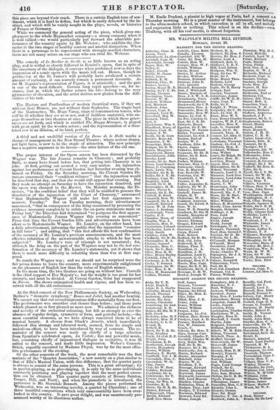At the third concert of the New Philharmonic Society, on
Wednesday, Berlioz's "dramatic symphony," Borneo and Juliet, had another hearing. We cannot say that our second impressions differ materially from our first. The performance was smoother and clearer than before; and those parts which pleased us at first pleased us more now. We admired the richness and novelty of the orchestral colouring, but felt as strongly as ever the absence of regular design, symmetry of form, and grateful melody,—the most essential elements, as we have always conceived them to be of musical beauty. A chorus from Gluck's Armeia, which immediately followed this strange and laboured work, seemed, from its simple and melodious effect, to have been introduced by way of contrast. The re- mainder of the concert 11118 made up chiefly of a large selection from Spontini's celebrated opera, La Vestale fine and powerful music, but, consisting chiefly of impassioned dialogue in recitative, it was ill suited to the concert, and made little impression. Webees Concert- Stuck, superbly executed by Madame Pleyel, was by far the most effec- tive performance of the evening.
Of the other concerts of the week, the most remarkable was the first matinee of the "Quartet Association," a new society on a plan similar to that of Ella's Musical Union, with this difference, that the quartet party is always to consist of the same persons. This is a great advantage; for in quartet-playing, as in glee-singing, it is only by the same individuals constantly practising and playing together that the most perfect execu- tion can be obtained. This quartet party consists of Messrs. Sainton, Cooper, Hill, and Piatti; and when the pianoforte is introduced, the pertormer is Mr. Sterndale Bennett Among the pieces performed on Wednesday, was an interesting novelty, a quartet by Cherubini one of three beautiful compositions which very unaccountably have been over- looked in this country. It gave great delight, and was unanimously pro- nounced worthy of its illustrious author. M. Emile Prudent, a pianist in high vogue at Paris, had a concert on Thursday morning. He is a great master of the instrument, but belongs to the ultra-modern school, in which execution is all in all, and melody and expression little or nothing. This school is on the decline—even Thalberg, with all his real merits, is almost forgotten.


























 Previous page
Previous page